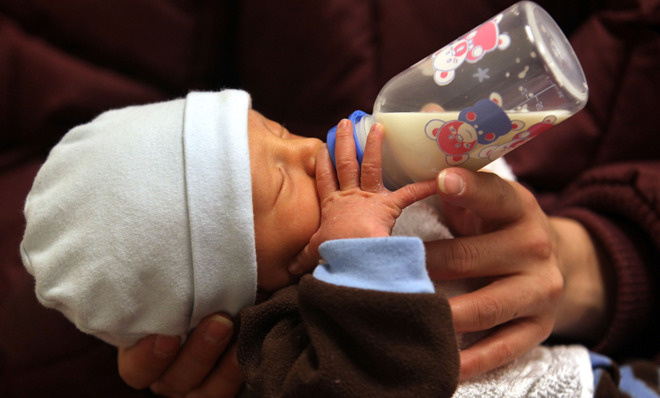Why mothers are buying breast milk online
A new report about tainted breast milk sheds light on a growing area of the baby market

A free daily email with the biggest news stories of the day – and the best features from TheWeek.com
You are now subscribed
Your newsletter sign-up was successful
Mothers are increasingly turning to the internet to buy breast milk for their newborns.
The problem? Researchers from Nationwide Children's Hospital found that nearly 75 percent of the breast milk they purchased online was contaminated by potentially harmful bacteria, including salmonella. Twenty percent of the samples contained cytomegalovirus, or CMV, which can cause serious illness in premature babies.
Sites like OnlyTheBreast.com function kind of like a Craigslist for mothers, connecting women who want to donate or sell their breast milk with mothers who want to buy it. As Katie Drummond pointed out at The Verge, the posts on these sites often "read like a series of personal ads for human mammary fluids," boasting qualities like "my milk is gluten-free, dairy-free, and nut-free" to potential buyers.
The Week
Escape your echo chamber. Get the facts behind the news, plus analysis from multiple perspectives.

Sign up for The Week's Free Newsletters
From our morning news briefing to a weekly Good News Newsletter, get the best of The Week delivered directly to your inbox.
From our morning news briefing to a weekly Good News Newsletter, get the best of The Week delivered directly to your inbox.
The main culprits for the potentially unsafe milk, according to the study published in the November issue of Pediatrics, are poor handling by the donors or sellers, unclean containers, and long shipping times, which can allow for bacteria to grow if sellers don't pack their milk with dry ice or use other cooling methods.
Seeing as the prospect of buying human milk online seems inherently sketchy, if not dangerous, why are mothers doing it?
The "breast is best" motto doesn't come from nowhere. The World Health Organization recommends exclusive breastfeeding for the first six months of a baby's life, and the benefit newborns get from the nutrients and antibodies in breast milk is well-documented.
But not every mother can breastfeed her child, including women on certain prescription drugs, adoptive mothers, and those who are physically unable to breastfeed because of, say, a mastectomy.
A free daily email with the biggest news stories of the day – and the best features from TheWeek.com
That leaves them in a tough spot. Besides milk-sharing sites, there aren't a lot of places for moms to find breast milk.
One alternative are milk banks, which are a safer bet thanks to strict screening standards and mandatory pasteurization. Unfortunately, they aren't even close to meeting the national demand, supplying just 2.15 million ounces of the needed 9 million ounces of breast milk in 2011, according to The New York Times.
Much of that milk is reserved for premature babies in hospitals, with the remaining supply is only available to healthy babies with a prescription.
Rachel Emma Silverman, writing for the Wall Street Journal in 2011, explained why more women probably don't donate:
I won't sugarcoat it: The screening process to donate to a milk bank might be prohibitive for many mothers, because of the time and restrictions involved… I had to fill out a lengthy health and lifestyle questionnaire, have two phone interviews with milk bank staffers, and a blood draw to make sure that I was an appropriate donor. Drinking, smoking, or even regularly taking medications or herbal supplements, including common SSRI antidepressants, are considered no-nos for donors (with some exceptions)… What's more, at this milk bank you needed to be able to give at least 100 ounces of milk, which means that moms can't just drop off a few extra 6-ounce baggies found deep in the freezer. [Wall Street Journal]
Those high standards explain why milk banks charge as much as $6 an ounce — meaning your average 1-month-old would cost you $150 per day to feed. Compare that to the $1.47 an ounce researchers paid on milk-sharing sites.
In the meantime, the FDA hasn't explicitly banned breast milk sold online, only recommending against "feeding your baby breast milk acquired directly from individuals or through the internet."
So what is the solution? In the long term, the study recommends that more women donate to milk banks, instead of selling or donating their milk online. For mothers who want to buy breast milk right now, however, there just aren't that many good options.
"I hate to say this to an informal sharer, because they are trying to do good," Kim Updegrove, president of the Human Milk Banking Association, told the Times. "But they are playing a game of Russian roulette."
Keith Wagstaff is a staff writer at TheWeek.com covering politics and current events. He has previously written for such publications as TIME, Details, VICE, and the Village Voice.
-
 Why are election experts taking Trump’s midterm threats seriously?
Why are election experts taking Trump’s midterm threats seriously?IN THE SPOTLIGHT As the president muses about polling place deployments and a centralized electoral system aimed at one-party control, lawmakers are taking this administration at its word
-
 ‘Restaurateurs have become millionaires’
‘Restaurateurs have become millionaires’Instant Opinion Opinion, comment and editorials of the day
-
 Earth is rapidly approaching a ‘hothouse’ trajectory of warming
Earth is rapidly approaching a ‘hothouse’ trajectory of warmingThe explainer It may become impossible to fix